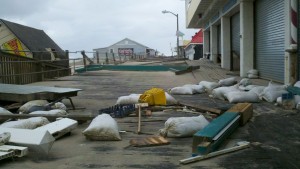Stephen Schneider
Stephen Schneider has lived in Point Pleasant, New Jersey for nearly all of his life. He holds a degree in Electronic Engineering and currently works as an operations manager for a solar energy company. During Hurricane Sandy, he stayed in his home and watched as over a foot of ocean water inundated his living room. In this narrative, Steven recalls the devastation that afflicted his community and comments on the challenges of recovery.
What do you like most about living in this community the best? What makes it home to you?
First off, it’s all I’ve known, and like I mentioned, fifth generation, so I have lots of family here, too. And I look around the room, and a lot of them are here right now, so it’s family oriented for me, and in doing so, you get to know a lot of the community. And I think that one of the things that that this storm did is that it kind of stirred up our ability to take care of each other through trying times such as that.
What were your expectations for the storm? Were you very worried about it? Did you take any big precautionary measures?
I mentioned my engineering degree, so I am a bit of a nerd. I did the math on what they said about the storm surge and knew what my elevation was. So, I actually went through proactively and elevated most of the items in my house proactively, and I was about three inches above the watermark when it all happened, so, just prepared. You know, they said it was coming, and it was amazing how accurate they were four days in advance. I think they got it within, what, fifteen miles of where it actually hit the coastline, so they did a good job that time. Helped.
Were you worried about Sandy and what they said? Did you live through the other storms?
Yes. I was here for the hurricane that was just one year previous to that since Sandy came through. Irene. I remember its name, huh. That storm was noticeable. It flooded. We saw some damage from it. I have one tree in the backyard that is about a seventy-foot sycamore tree. When the winds come from the northeast, they come off the ocean. It’s probably one of the first structures it hits. Trees been beat up, so you know after the first storm hit. Sandy, sure, I’ve been around through Gloria back in the early ‘80s. There were hurricanes. This was the one that kinda put it all in perspective, though, for sure. Nothing even came close.
What do you remember when you saw your home for the first time after the hurricane?
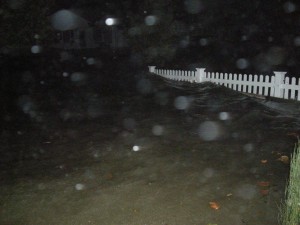 I didn’t leave. So it was during the process, when the water started rising. We knew what time high tide was, eight o’clock. Being about a quarter mile inland, we figured it would take another twenty minutes to make its way through the houses to where we were, so it was more or less a race against time to see what happened.
I didn’t leave. So it was during the process, when the water started rising. We knew what time high tide was, eight o’clock. Being about a quarter mile inland, we figured it would take another twenty minutes to make its way through the houses to where we were, so it was more or less a race against time to see what happened.
On Google Maps, you can get your basic elevation, so you can see where ground level is. You just add your foundation, and to see how high you are above there. I’m about eight and a half feet. Storm surge they said were expecting about ten feet, so I had to get everything up about another foot [or] two feet up. And it was very accurate, too. They were pretty close.
Around five to eight, I think I realized it was a losing battle. The water, once the water came into the house, it came into the house quick, and then it was time to have a beer. Things happen.
It was shocking to see a foot of water in your house. Only about a foot of water in the house, which was enough. It was shocking to know that the Atlantic Ocean is in your living room, but it wasn’t overwhelming, actually. It was a state of preparation, sitting back and waiting through the process, and then following, that was probably a decent state of intoxication [from the beer].
Could you share more stories about that night?
Like I said, it all happened very fast. Actually, you could see the water coming down. Morning high tide, the water came up, and it was probably about halfway up the driveway, so it was a pretty good sign that it was gonna be bad. That night, it was the highest I’ve ever seen it. During the storm of ’92, the water came up to the garage slightly. I wasn’t living here at the time. When the water started coming up, the evening towards the high tide was well in advance of high tide, you knew it was gonna be a good one. Wind was howling. It was the perfect storm. They talked about the perfect storm. Barometric pressure was the lowest it has ever been in Northeastern United States. Winds were coming directly out of the east, driving the floodwaters onto the coastline. Full moon, dead full moon. You can’t do that if you tried again, and the time that the storm came on shore was exactly at high tide, so it was actually a perfect culmination of everything. And all you could do is prepare, and then sit back and see what happens.
So, there was one closet in my house which kinda dips in. The water came in the floorboards there, so as soon as I turned around, there was water in the house, so it was a very quick process. Fortunately, and I mentioned this before, the river and the bay let the water in and they also let the water out as quickly. So the water came in around eight. It was there about an hour and it was gone for us. All it takes for damage is to come in and go out, but then you have homes on the bayside or up in Toms River area where the water was sitting for three days, so there were again worst cases. Water came out, kinda smelled right off the bat. It was brownish kinda water. There were fish in different areas. I don’t know how they were getting into the house, but it was interesting. Next morning, I woke up very, very early, about, well, not that early. 6:30 I got out of the house, went for a walk, right away, winds were probably about 50 miles per hour. I was very careful but [wanted] to get up to the boardwalk and see everyone. I only saw a couple of people up there, but I got to hear their stories.
When the storm hit, did you lose power? Did you stay the whole time afterwards too?
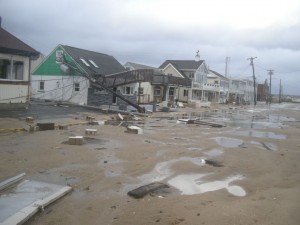
At a certain point in time, a funny story in a sense; my parents live on the other side of town, always have. I called my dad around four o’clock. I still had power. No, the wind was blowing, but there was no water out front and nothing was happening. He had lost power over there, so I called him up and I’m watching TV. I’m making popcorn. “Come on over. We’re having a great time,” [I said]. And about an hour later, the water started coming down the block about three hours in advance of the next high tide, so you knew this one was gonna be a good one. It started getting dark out, and simultaneously, all three of these things happened, and they cut the power. Because, I think as they saw the water coming up, they cut the power proactively to be able to prevent fires. So, in a sense, it all happened at once. I stayed in the house for about two to three days. I was cleaning out my garage as the president and the governor flew over in a helicopter. Right over the house, actually, and I know we were supposed to leave, but being able to stay behind, I was gutted and cleared out by the time everybody else was allowed to come back into town. So I was actually able to be proactive in the restoration process, and I knew we weren’t going to be dealing with massive waves and running water. It was then I went to family, yes, about three days afterwards I stayed with family.
Since you are an electrical engineer, how did they restore power to homes?
We have JCP&L here, Jersey Central Power and Light, and they cut the power systematically as the floodwaters started coming up because they knew we were going to be going under, and the electrical systems were going under, so it was very, very smart to do. Days after the flood, we had a pretty long delay before our power was brought back. I think we were just under two weeks before power was restored back to my neighborhood. What they had to do is, house by house, go around and check the level of your meter, so if your meter was submerged, you had to bring an electrician in and replace your box and meter and portions of your electrical system before they’ll reenergize you. Anybody that was above [with] the meter, they would reenergize you, and you could turn on your electrical system if you chose to do so. Essentially, it removes the risk from [the utility]] up to the meter ‘cause the meter is theirs, so when anything goes beyond the meter, it’s really your fault, your problem. Which is probably the right thing to do, because you don’t want to just turn the power back on, fighting fires, so they were actually very systematic about it.
But it wasn’t in terms of risk loss, though. Anybody that did have electrical systems that went under really had to rip them out, which is another concern, too, cause you have saline water, lots of salt in there. Corrosive. It was dirty [with] sewer material in there, all kinds of stuff. As that sits in contact points with all these wires, they corrode over time, and there is a high probability that someone’s older electrical system will burst to flames at some point. And again, it’s not something that’s gonna happen immediately, so again, you look in the windows of these houses and wonder if they’ve replaced their electrical systems that [went] under, because if they didn’t, they’re still vulnerable.
How have you liked what they have done in terms of rebuilding?
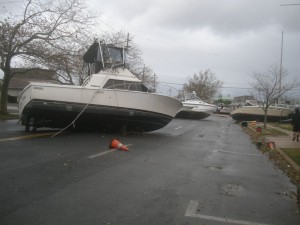
Aesthetically, functionally, I think it’s appropriate in many cases. You see a lot of houses go up, and when something goes up, it’s going to stay out of the water. Aesthetically, some of them are a little visually challenging. You see whole new levels pop up under floors that just don’t make sense, but something we will probably get used to. In the bigger picture, there’s been a lot of speak about dune construction along the coastline to be able to prevent the waves from coming over. One of the things that I think that people are overlooking is the topography of the land. We’ve got the bay down south of us here, and years ago, when the water elevation was higher, you would see this bay continued straight through every area that flooded through Point Pleasant Beach and up into Manasquan, because there’s a trough. There’s a depression. There’s three lakes in town here and those lakes line up. So when the water level rises that fills up like a bathtub. It comes in from the river, and it comes in from the bay, and I would say we were flooded before waves even came over the ocean [front] where we are in Point Pleasant Beach, so protection on the river and bay front I think are some things that need to be considered as well.
So, your rebuilding process has been good, would you say?
Definitely challenging. You know, you got to see it as an opportunity. Typical American, if you gotta rebuild something, you built it better so you take that as an opportunity. Obviously, the process is very, very challenging. Not so accommodating to be able to build easily just in terms of the banks and the insurance, and, obviously, there’s a lot of layers involved, but the process is well under way.
Did the storm affect your job at all? Did you have to take any precautions with your job?
Yes. I mentioned I oversee the operations of solar facilities across New Jersey, about a hundred different sites, so we were shut down. Just the office was shut down for I would say about a week, week and a half. Our solar systems across the state of New Jersey were also shut down because they all rely on grid power in order to operate. So, when the grid was down for a week, so were our solar systems, and a few days after the storm, we actually mobilized to go to every single one of the sites and just verify that everything was still on the roofs that [the solar panels] hadn’t migrated.
How was your relationship with the community changed? Have you become tighter with the community here?
Absolutely. I think we’ve become focused more on fundamentals. You know, it’s interesting. You really take electricity and hot water and those things for granted. You don’t even acknowledge them growing up, so when you lose them for a little while, it’s amazing how much you take the value in them, too. But, one thing I did discover, and I always knew this, the great people that I have in my neighborhood really helped each other out with generators or whatever the case may be. We were helping batten down the hatches during the storm, before the storm, and then all through the process [after], too. So, [you] get to understand how good of a community this really is, and in the days after the storm once people were allowed back into the neighborhood, there were probably more volunteers than homeowners roaming the streets to help people out. It was really great to see. Really encouraging.
Are you happy with where the community is now?
I don’t think so, ‘cause like I said, when you drive by these houses, you don’t know what’s going on inside. There’s a lot [of them]. Over the course of the last summer, you could see how quiet the neighborhoods really were. And you know we were, everyone was, very focused on business. Business was important because it’s tax revenue and it’s everything driving forward. But I do think that a lot of the residents are fending for themselves in the process and even primary homeowners, you know, they’re really on their own in many ways, and could probably use a lot more support.
Are there still businesses that are closed down that are important to the town?
Most bounced back pretty strong. I say most the waterfront businesses were all opened up by the summertime. Actually, the boardwalk was back together again. There’s still buildings that are destroyed, you know, that need to be put back together. Smaller businesses, tackle shops, bagel places up there [are] still coming back together, but for the most part, I would say no on the business level. Again, that was the focal point I think, on getting everything back together, ‘cause the Jersey Shore’s a tremendous source of revenue for the state. Forget the numbers, but I think it’s along the lines of fifty billion dollars and a very fair percentage of the [state’s] income. The state has revenue. So I think that was the focal point, and it’s pretty well taken care of.
How has your life changed after the storm?
I don’t think we’ve really settled into the normal routine yet, just because there’s other things to still be done. I still need to get my money back from the bank, so there’s a couple tens of thousands of dollars still, so, but things are starting to get back in. But, you can’t help but to think about when you drive through town here everything looks okay. You know it looks like it’s really coming back together, but you have no idea what’s going on inside. A lot of these houses, and even when you see cars back at the houses, there’s a good chance that nothing was done to that house. And whether there was no flood insurance. It’s the one thing always through this process, I was fortunate to have flood insurance. Acknowledging that there were so many other people that are far worse off, not only this town, but other towns where they don’t even have homes left, so we didn’t lose too many homes. In this house, we just it got really wet.
Were you pleased with the government’s overall response?
Different question. Because I do separate my flood insurance, which is a federal program. I pay for that, though, so it’s not free. I pay the premiums to get the benefits, so when the benefit comes it’s not really a federal grant, it’s something that I bought. With the elevation programs, that’s the lingering issue that we really don’t know what direction it’s gonna take. In my neighborhood, about three houses or four houses came down on my block, and they’re gonna go back up at a higher elevation. There’s a lot of existing homes that already have a higher elevation, so anyone that is below base [flood] elevation, the value of your home is going to suffer, naturally, and you have insurance costs, so you know we were kinda [told to] rebuild, We were told, “rebuild your homes and you’ll get grants to raise your houses’, so that’s really what we’re all still sitting back waiting for. Along those lines, I applied, and my neighbor applied. Same exact structure. I’m actually a couple inches lower and closer to the ocean, just by a few feet. She’s directly east of me, or west of me. She was accepted, I was denied, so you really question the process in this, as well. So [I’m] prepared for another fight, I was told to rebuild, and that they would help us elevate, so I’m gonna keep driving toward that.
Were you aware of how big the storm was everywhere else?
Lots of credit to Facebook. I mean that’s, really, its amazing, actually. That’s the only way to communicate. Like the first few days or so, I could not get phone calls in or out. Text messages, you don’t know if they went through or if they didn’t. Facebook was really how we got all of our information, posted pictures. When I went on my little walk first thing in the morning, I put those pictures up, and I was amazed [at] the response that I got from everybody. Just shock. Had a lot of people that were in the area that were able to do that, so you could see what was going on. Didn’t have television, but you could still [see] people that did have it were taking screen grabs and putting the news channel [on] what was developed down near Mantoloking, things like that, on TV. So you could see that it was pretty widespread.
Do you think the relief has diminished now? Do you think that people still need it, or that the initial damage is controlled now and everybody is on track?
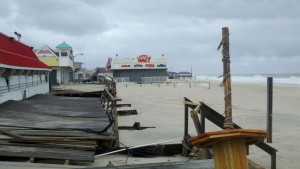 Well, I understand how complex the process could be, ‘cause you do read about what happened down in Louisiana, and they distributed tens of thousands of grants to elevate homes. They didn’t do a good job with the process, and the people ended up walking away with the money. So they tried to organize the process a little bit more, which makes very good sense. You don’t want people just walking away with money that’s supposed to improve or correct the problem, but I don’t know of anyone who’s gotten money yet. I don’t know exactly when people get distributions. They could have happened, or might not have happened. I do think there is a little more information that needs to be shared with the people, and it’s definitely not over. There’s a lot more work to be done, even in a situation like mine where I’m rebuilt and back in the house. Everything’s good, [but] I’m still vulnerable. You know, the house still is where it was, so it needs to go up. And I have the fight in me where I have no problem making phone calls to keep pushing forward ‘til I get what I need to get done. But not everybody is like that, nor can they be. And those are the people you got to worry about. The ninety-two-year old lady who lives two houses away from me, her house is pretty low, and there’s a good chance that no one will ever consider what’s going to happen to her.
Well, I understand how complex the process could be, ‘cause you do read about what happened down in Louisiana, and they distributed tens of thousands of grants to elevate homes. They didn’t do a good job with the process, and the people ended up walking away with the money. So they tried to organize the process a little bit more, which makes very good sense. You don’t want people just walking away with money that’s supposed to improve or correct the problem, but I don’t know of anyone who’s gotten money yet. I don’t know exactly when people get distributions. They could have happened, or might not have happened. I do think there is a little more information that needs to be shared with the people, and it’s definitely not over. There’s a lot more work to be done, even in a situation like mine where I’m rebuilt and back in the house. Everything’s good, [but] I’m still vulnerable. You know, the house still is where it was, so it needs to go up. And I have the fight in me where I have no problem making phone calls to keep pushing forward ‘til I get what I need to get done. But not everybody is like that, nor can they be. And those are the people you got to worry about. The ninety-two-year old lady who lives two houses away from me, her house is pretty low, and there’s a good chance that no one will ever consider what’s going to happen to her.
Do you think that there was too much emphasis put on the economics and not as much on the individual people?
Yes. Yes, and again, I get it when the U.S economy starts tanking, they pump money into big businesses, and they make it easy for big businesses to drive you forward, so you need to have the bigger picture cared for on a grander scale. So by maintaining the businesses, you do take care of the whole situation. However, people are people and they need to be taken care of, too, and you have all different individuals living in towns and [with differing] abilities that have to fight, as well, so people really are taking care of themselves right now. I think a lot of them could use more support and information. You know, there’s a lot that I still don’t know in terms of the process, and its difficult, because you know the federal government is very proactive. “We’re gonna do this,” so the state government says. Alright, the federal government has this, and the state government also has this, so the county government steps back, and there’s so many layers to it. I think that it needs to filter down to, a little more, to local level so they can assess what’s going on.
Would consider yourself lucky compared to everything else you saw?
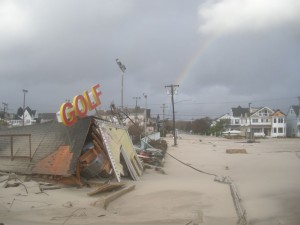
Absolutely. Relative to everyone, absolutely. Even in the rebuilding process, I mean, it’s an opportunity to put something back together. I had insurance. Although, the dollars probably won’t cover everything actually, never does. When you go about ripping apart a sixty-year old house, you find more wrong with it than you thought you had, but all you had to do was look at the news of a couple towns south and realize it was not so bad here. We’ve got a very wide beach here. We have an inlet, Manasquan inlet, which has a jetty that goes out. Gulf stream travels north. So when it traps sand, we get one of the widest beaches [like] in Wildwood, Sandy Hook, those areas. So, it actually protected this town very well, and it was really just a matter of the water rising and falling, and getting clobbered by winds.
What do you think are the biggest things to take from the storm?
Well, I was blown away by the fact that, and I still haven’t been able to confirm this, but I haven’t seen anything contrary to it, the fact that on the barrier island, not a single person was lost during the storm. No one to the best of my knowledge. And if you can correct this, please let me know. But to the best of my knowledge, no one died on the barrier island, which is amazing given what happened. So, the lesson learned is if this is coming your way, do what we did, ‘cause that’s when you step back out and you see all these broken homes and flooding and damage, but you think everybody can pick up the pieces and kinda get going and no one’s going to a funeral. That was, that was pretty impressive I have to say, actually. So that would be the big statement, is do what we did, well not what I did, do what everyone else did.
Overall, how has the storm changed your life?
I’m tired. Well, it was, you know, it’s a lot of work, and obviously, you get used to waking up in the morning and taking a shower and brushing your teeth and going to work. And you get used to the process, and for a while, the process was turned upside down, obviously. Again, my situation, I see how many people, you know, how many good people I have in my life, how helpful they really were through the whole process; whether it was helping with somewhere to stay, or something with the house, or pitching in and giving a hand, [it] was something encouraging from that aspect. But, again, we’re still in the process, so you can’t really take a step back and relax until it’s over. And I would say it was tiring for sure. Definitely an experience, though.
Edited by Shannon Yeager
Point Pleasant Beach, New Jersey
Recorded November 9, 2013
Photographs by Stephen Schneider

